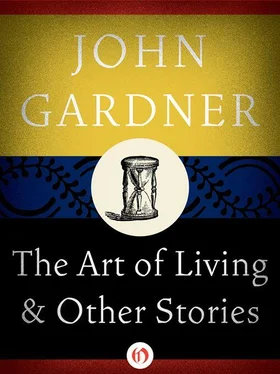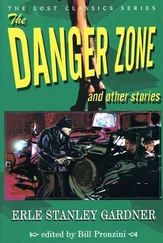Even from his father and his father’s brothers, who sometimes helped with the chores, he kept aloof. His father and uncles were not talkative men. Except for his father’s comic poems, they never told jokes, though they liked hearing them; and because they had lived there all their lives and knew every soul in the county by name, nothing much surprised them or, if it did, roused them to mention it. Their wives might gossip, filling the big kitchen with their pealing laughter or righteous indignation, but the men for the most part merely smiled or compressed their lips and shook their heads. At the G.L.F. feedstore, occasionally, eating an ice cream while they waited for their grist, they would speak of the weather or the Democrats; but in the barn, except for “Jackie, shift that milker, will you?” or “You can carry this up to the milk house now,” they said nothing. They were all tall, square men with deeply cleft chins and creases on their foreheads and muscular jowls; all Presbyterians, sometimes deacons, sometimes elders; and they were all gentle-hearted, decent men who looked lost in thought, especially Jack’s father, though on occasion they’d abruptly frown or mutter, or speak a few words to a cow, or a cat, or a swallow. It was natural that Jack, working with such men, should keep to himself, throwing down ensilage from the pitch-dark, sweet-ripe crater of the silo or hay bales from the mow, dumping oats in front of the cows’ noses, or — taking the long-handled, blunt wooden scraper from the whitewashed wall — pushing manure into the gutters.
He felt more community with the cows than with his uncles or, when he was there, his father. Stretched out flat between the two rows of stanchions, waiting for the cows to be finished with their silage so he could drive them out to pasture, he would listen to their chewing in the dark, close barn, a sound as soothing, as infinitely restful, as waves along a shore, and would feel their surprisingly warm, scented breath, their bovine quiet, and for a while would find that his anxiety had left him. With the cows, the barn cats, the half-sleeping dog, he could forget and feel at home, feel that life was pleasant. He felt the same when walking up the long, fenced lane at the first light of sunrise — his shoes and pants legs sopping wet with dew, his ears full of birdcalls — going to bring in the herd from the upper pasture. Sometimes on the way he would step off the deep, crooked cow path to pick cherries or red raspberries, brighter than jewels in the morning light. They were sweeter then than at any other time, and as he approached, clouds of sparrows would explode into flight from the branches, whirring off to safety. The whole countryside was sweet, early in the morning — newly cultivated corn to his left; to his right, alfalfa and, beyond that, wheat. He felt at one with it all. It was what life ought to be, what he’d once believed it was.
But he could not make such feelings last. No , he thought bitterly on one such morning, throwing stones at the dull, indifferent cows, driving them down the lane. However he might hate himself and all his race, a cow was no better, or a field of wheat. Time and again he’d been driven half crazy, angry enough to kill, by the stupidity of cows when they’d pushed through a fence and — for all his shouting, for all the indignant barking of the dog — they could no longer locate the gap they themselves had made. And no better to be grain, smashed flat by the first rainy wind. So, fists clenched, he raged inside his mind, grinding his teeth to drive out thought, at war with the universe. He remembered his father, erect, eyes flashing, speaking Mark Antony’s angry condemnation from the stage at the Grange. His father had seemed to him, that night, a creature set apart. His extended arm, pointing, was the terrible warning of a god. And now, from nowhere, the black memory of his brother’s death rushed over him again, mindless and inexorable as a wind or wave, the huge cultipacker lifting — only an inch or so — as it climbed toward the shoulders, then sank on the cheek, flattening the skull — and he heard, more real than the morning, his sister’s scream.
One day in August, a year and a half after the accident, they were combining oats — Jack and two neighbors and two of his cousins — when Phoebe came out, as she did every day, to bring lunch to those who worked in the field. Their father had been gone, this time, for nearly three weeks, and since he’d left at the height of the harvest season, no one was sure he would return, though as usual they kept silent about it. Jack sat alone in the shade of an elm, apart from the others. It was a habit they’d come to accept as they accepted, so far as he knew, his father’s ways. Phoebe brought the basket from the shade where the others had settled to the shade here on Jack’s side, farther from the bright, stubbled field.
“It’s chicken,” she said, and smiled, kneeling.
The basket was nearly as large as she was — Phoebe was seven — but she seemed to see nothing unreasonable in her having to lug it up the hill from the house. Her face was flushed, and drops of perspiration stood out along her hairline, but her smile was not only uncomplaining but positively cheerful. The trip to the field was an escape from housework, he understood; even so, her happiness offended him.
“Chicken,” he said, and looked down glumly at his hard, tanned arms black with oat-dust. Phoebe smiled on, her mind far away, as it seemed to him, and like a child playing house she took a dishtowel from the basket, spread it on the grass, then set out wax-paper packages of chicken, rolls, celery, and salt, and finally a small plastic thermos, army green.
She looked up at him now. “I brought you a thermos all for yourself because you always sit alone.”
He softened a little without meaning to. “Thanks,” he said. She looked down again, and for all his self-absorption he was touched, noticing that she bowed her head in the way a much older girl might do, troubled by thought, though her not quite clean, dimpled hands were a child’s. He saw that there was something she wanted to say and, to forestall it, brushed flying ants from the top of the thermos, unscrewed the cap, and poured himself iced tea. When he drank, the tea was so cold it brought a momentary pain to his forehead and made him aware once more of the grating chaff under his collar, blackening all his exposed skin, gritty around his eyes — aware, too, of the breezeless, insect-filled heat beyond the shade of the elm. Behind him, just at the rim of his hearing, one of the neighbors laughed at some remark from the younger of his cousins. Jack drained the cup, brooding on his aching muscles. Even in the shade his body felt baked dry.
“Jack,” his sister said, “did you want to say grace?”
“Not really,” he said, and glanced at her.
He saw that she was looking at his face in alarm, her mouth slightly opened, eyes wide, growing wider, and though he didn’t know why, his heart gave a jump. “I already said it,” he mumbled. “Just not out loud.”
“Oh,” she said, then smiled.
When everyone had finished eating she put the empty papers, the jug, and the smaller thermos in the basket, grinned at them all and said goodbye — whatever had bothered her was forgotten as soon as that — and, leaning far over, balancing the lightened but still-awkward basket, started across the stubble for the house. As he cranked the tractor she turned around to look back at them and wave. He nodded and, as if embarrassed, touched his straw hat.
Not till he was doing the chores that night did he grasp what her look of alarm had meant. If he wouldn’t say grace, then perhaps there was no heaven. Their father would never get well, and David was dead. He squatted, drained of all strength again, staring at the hoof of the cow he’d been stripping, preparing her for the milker, and thought of his absent father. He saw the motorcycle roaring down a twisting mountain road, the clatter of the engine ringing like harsh music against shale. If what he felt was hatred, it was a terrible, desperate envy, too; his father all alone, uncompromised, violent, cut off as if by centuries from the warmth, chatter, and smells of the kitchen, the dimness of stained glass where he, Jack, sat every Sunday between his mother and sister, looking toward the pulpit where in the old days his father had sometimes read the lesson, soft-voiced but aloof from the timid-eyed flock, Christ’s sheep.
Читать дальше












